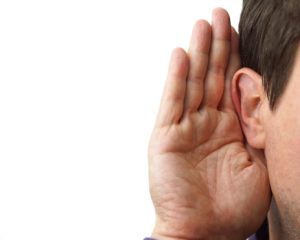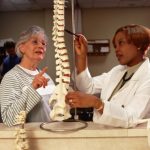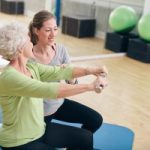 Although osteoporosis mainly affects the bones, a new link has emerged between osteoporosis and hearing loss.
Although osteoporosis mainly affects the bones, a new link has emerged between osteoporosis and hearing loss.
According to the International Osteoporosis Foundation, one in three women over the age of 50 will develop osteoporosis – a disease categorized by bones becoming weak and brittle. While commonly referred to as a woman’s disease, men are not immune. In fact, within America alone, nearly two-million men have osteoporosis and another eight to 13 million have low bone density.
Sudden hearing loss increases among those with osteoporosis
Advertisement
 Losing bone density and increasing one’s risk of injury is bad enough, but research from Taiwan uncovered that people with osteoporosis also suffer from hearing loss.
Losing bone density and increasing one’s risk of injury is bad enough, but research from Taiwan uncovered that people with osteoporosis also suffer from hearing loss.
The study, which took place between 1999 and 2008, compared people with osteoporosis against those who did not have it. Researchers found by the end of 2011 that those with osteoporosis had an increased risk of sudden deafness – rapid hearing loss usually occurring in one ear – by 76 percent.
Generally, this form of hearing loss is temporary and the individual can regain some hearing, but the connection between the two conditions isn’t quite clear. Researchers are unaware of a cause and effect, but theorized it may have something to do with the health of the heart and bone demineralization.
They recommend that individuals who do experience sudden deafness and who have osteoporosis seek out medical attention. The findings were published in the Journal of Clinical Endocrinology and Metabolism.
Tips to prevent osteoporosis and hearing loss
Advertisement
 When it comes to preventing osteoporosis, age is a factor. Although you can’t control getting older, you can still take steps to keep your bones strong and healthy to deter the onset of the disease. Some useful tips to prevent osteoporosis are:
When it comes to preventing osteoporosis, age is a factor. Although you can’t control getting older, you can still take steps to keep your bones strong and healthy to deter the onset of the disease. Some useful tips to prevent osteoporosis are:
- Ensure you are getting adequate calcium and vitamin D.
- Exercise regularly.
- Eat plenty of vegetables – especially leafy greens.
- Reduce your soda intake.
- Eat nuts.
- Minimize sodium intake.
- Remember to get checked for osteoporosis.
Men are less likely to get checked for osteoporosis and when asked if they would get screened only 25 percent of surveyed men agreed. This was according to a study completed at North Shore LIJ Health System in New York.
Additionally, it’s important to be mindful of preventing injury. If your bones are becoming weaker, they will be prone to breaking and recovery is much harder as we age.
